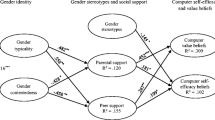Abstract
Gender differences in perceived self-efficacy for computer use may help account for differential computer interest and course enrollment at the college level. Three hundred sixty-eight students completed a two-page questionnaire assessing perceived computer self-efficacy, plans to take a computer science course, perceived importance of computing skills, and interest in learning about computers. Men rated themselves higher than did women for perceived self-efficacy. They were also more positive on the cognitive outcome measures, but with computer self-efficacy held constant, the magnitude of these differences was decreased, suggesting that perceived self-efficacy may be an important consideration when examining gender differences in computer interest and use.
Similar content being viewed by others
References
Bandura, A. Social learning theory. Englewood Cliffs, NJ: Prentice-Hall, 1977. (a)
Bandura, A. Self-efficacy: Toward a unifying theory of behavioral change. Psychological Review, 1977, 84, 191–215. (b)
Bandura, A. Self-efficacy mechanism in human agency. American Psychologist, 1982, 37, 122–147.
Betz, N. E. Prevalence, distribution and correlates of math anxiety in college students. Journal of Counseling Psychology, 1978, 25, 441–448.
Betz, N. E., & Hackett, G. The relationship of career-related self-efficacy expectations to perceived career options in college men and women. Journal of Counseling Psychology, 1981, 28, 399–410.
Boli, J., Katchadourian, H., & Mahoney, S. The Stanford curriculum study: Looking at student course choices and how they vary. Campus Reports Supplement, October 19, 1983, p. 13.
Brody, L., & Fox, L. H. An accelerative intervention program for mathematically gifted girls. In L. H. Fox, L. Brody, & D. Tobin (eds.), Women and the mathematical mystique. Baltimore, MD: The John Hopkins University Press, 1980.
The College Board. 1984 Advanced Placement Program national summary reports. New York: College Entrance Examination Board, 1984.
Dachey, K. Computing not gender neutral: Females more intimidated. The Stanford Daily, April 8, 1983, p. 5.
Dweck, D. C., & Bush, E. S. Sex differences in learned helplessness: I. Differential debilitation with peer and adult evaluators. Developmental Psychology, 1976, 12, 147–156.
Hackett, G., & Betz, N. E. A self-efficacy approach to the career development of women. Journal of Vocational Behavior, 1981, 81, 326–339.
Hess, R. D., & Miura, I. T. Gender differences in enrollment in computer camps and classes. Sex Roles, 1985, 13, 193–203.
Jagacinski, C. M., LeBold, W. K., & Salvendy, G. Predicting persistence in computer-related fields for men and women. Paper presented at the annual meetings of the American Psychological Association, Los Angeles, CA, August 1985.
Kiesler, S., Sproull, L., & Eccles, J. S. Second-class citizens? Psychology Today, March 1983, pp. 41–48.
Markoff, J. Who's in front? InfoWorld, 1983, 5, 32–36.
Miura, I. T., & Hess, R. D. Sexual stereotypes in titles of educational and entertainment software. Paper presented at the Western Psychological Association Convention, Seattle, WA, May 1986.
Naiman, A. On video arcades: A microsermon. Classroom Computer News, September/October 1982, pp. 82–83, 94.
Saunders, J. What are the real problems involved in getting computers into the high school? The Mathematics Teacher, 1978, 71, 443–447.
Stein, A. H., & Smithells, J. Age and sex differences in children's sex-role standards about achievement. Development Psychology, 1969, 1, 252–259.
United States National Center for Educational Statistics. Digest of Educational Statistics, 1985, (From Statistical Abstracts, 1985, p. 158).
Winkle, L. W., & Mathews, W. M. Computer equity comes of age. Phi Delta Kappan, 1982, 63, 314–315.
Author information
Authors and Affiliations
Additional information
The author wishes to thank Dr. Martin Ford and Dr. Albert Bandura for their helpful comments on an earlier version of this article. This research was supported by a grant from the San Jose State University Foundation. Portions of this research were reported at the annual meetings of the American Educational Research Association in San Francisco, April 1986.
Rights and permissions
About this article
Cite this article
Miura, I.T. The relationship of computer self-efficacy expectations to computer interest and course enrollment in college. Sex Roles 16, 303–311 (1987). https://doi.org/10.1007/BF00289956
Issue Date:
DOI: https://doi.org/10.1007/BF00289956




